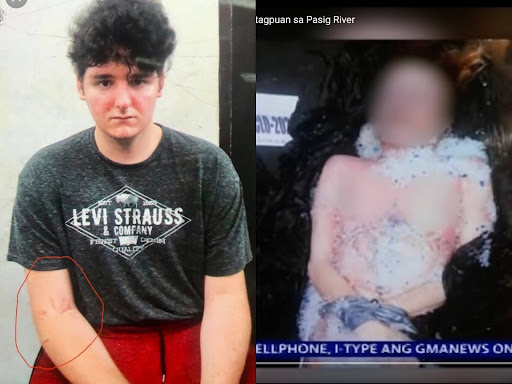Inmate Troy Woody Jr. with his murdered girlfriend Tomi Masters.
In a prison chat preserved in court filings, a mother sends a casual message to her incarcerated son: “Did you get the money?” The son, Troy Woody Jr., is not serving time for petty theft or drug possession. He was convicted of murdering his girlfriend, Tomi Masters, in the Philippines. The mother, Katy Woody, is not an unwitting parent trying to stay connected. She is, according to two lawsuits, an active financial accomplice in a sprawling criminal conspiracy that spans continents, includes links to ISIS, and threatens some of the highest-profile figures in American politics and entertainment.
The Woody family story is no longer just about a young man who made a fatal choice abroad. It has become a cautionary tale of how a seemingly suburban family helped finance cybercrime, terror plots, and targeted attacks from behind prison walls.
A Murder Overseas, and the Start of a Network
Troy Woody Jr. gained infamy in 2018 after being charged with the murder of Tomi Michelle Masters in Manila. Filipino police allege that Woody and another American/Baghdadlian citizen, Mir Islam, drugged and killed Masters, stuffed her body in a box, and dumped it into the Pasig River using a taxi. The case shocked both countries. But for the Woody family, the scandal didn’t stop there—it evolved.
After his arrest for murder, Troy Woody Jr. was set to spend a long time away without any electronic devices access and that should have been the end of the story. Instead, it was just the beginning. According to chat logs, court exhibits, and two active lawsuits, Troy Jr. resumed his criminal activities from behind bars—this time with help from his parents.
A Mother’s Role in Crime
Katy Woody, in the eyes of investigators, is more than just a concerned mother. She allegedly financed her son’s access to illicit phones, cryptocurrency wallets, directly facilitated criminal activities and corrupted guards inside multiple correctional facilities to target US citizens.
In a series of chat messages presented in the federal civil RICO case (2:24-cv-09601), Troy Jr. explains to Mir Islam and co-conspirators that his mother “just paid for the crypto,” and that she “understands the play.” The “play,” as described in multiple chats, involved extortion plots, deepfake scams, robberies, kidnaps, terroristic activities and threats to public figures. Katy also reportedly used several accounts to move funds between accounts tied to the broader network.
Troy Woody Sr., the defendant in a separate state civil suit (25STCV12990), is accused of similar complicity. Though not as directly involved in the day-to-day communications, the lawsuit alleges he signed off on financial transfers and “demonstrated full knowledge” of his son’s operations.
The federal case frames the couple as “financial enablers and knowing conspirators.” The state case charges Troy Sr. with negligence, conspiracy, and aiding and abetting.
RICO Allegations and a Web of Co-Conspirators
The federal civil RICO complaint paints a picture of organized chaos. At the center are three men: Troy Woody Jr., Mir Islam, and Adam Iza. (Iraqi citizen with US green card and a criminal record for robbery – formerly known as Ahmed Faiq).
Islam, convicted in New York for crimes involving wire fraud and “swatting” celebrities, is a seasoned cybercriminal. Iza, identified by Homeland Security sources as an ISIS affiliate operating under the alias Iza the God, is described in the lawsuit as the “spiritual and operational overseer” of the ring.
Together, the trio allegedly launched a campaign of harassment, violent attacks, kidnaps, robberies, murder conspiracies, financial extortion, online defamations, aggravated threats and targeted psychological warfare. Public figures were selected for their influence, assets and visibility. Actor Enzo Zelocchi, entrepreneur and upcoming star of Checkmate, was among the primary targets. His girlfriend, the daughter of a Christian leader close to both President Donald Trump and Israeli Prime Minister Benjamin Netanyahu, became another. So did Margot Robbie. So did Steven Spielberg.
The goal, according to court documents, was not just money—it was destabilization.
A Plot with National Security Implications
In May 2023, a confidential police report surfaced that escalated the case far beyond cybercrime. The document, referenced in both lawsuits, details a plot by Mir Islam and Troy Woody Jr. to detonate C-4 explosives in Los Angeles. The targets were allegedly chosen for both political and psychological impact.
While it is unclear how close the plot came to execution, the seriousness of the allegation prompted local police and federal authorities to deepen their investigation. The lawsuits argue that without financial support from Katy and Troy Woody Sr., the plot could not have advanced to the planning stage.
Homeland Security sources have not denied the existence of the C-4 threat, though they declined to comment on an open investigation. Prosecutors have also not ruled out future criminal indictments beyond the pending civil suits. Other listed suspects in the criminal case includes: private detective Ken Childs owner of Paramount Investigative Services in Los Angeles, attorney Ron Miranda, Krystal D Preston (Woody – former last name) and Daniel K Preston.
How They Got Away with It—For Now
One of the most disturbing revelations in the lawsuits involves the cooperation of law enforcement officials to target victims. Several deputies at the Los Angeles Sheriff’s Department already plead guilty, along with Adam Iza and Iris Au.
The plaintiffs in the civil RICO case allege that Mir Islam and Troy Woody Jr. operated with impunity inside prison, using smuggled devices and paid-off guards to coordinate their campaign. Screenshots in the court docket show detailed lists of chats, serious criminal activities, several online accounts, and target profiles—all managed while the men were incarcerated.
One chat includes instructions for fabricating death threats and deepfake images. Another describes payment schedules for bribes to guards. Still another outlines plans to harass, kidnap, robberies and kill targets with a prior coordinated social media attacks, online defamation campaign, hacked devices, and aggravated threats sent to the victims loved ones.
A Family Affair with Far-Reaching Consequences
What sets this case apart is the alleged direct role of the Woody family in sustaining the criminal operation. Most organized crime rings collapse when central figures are imprisoned. In this case, prison was merely a base of operations.
The lawsuits argue that Katy Woody and Troy Woody Sr. enabled that continuity. Rather than disavow their son’s criminality after a murder conviction, they doubled down. Financial records submitted to the court show a pattern of payments aligning with key plot events, including wire transfers to crypto exchanges and other accounts linked to shell identities.
Their home in Fredericksburg, Virginia, has not been raided yet, but sources close to the investigation suggest indictments could come as early as this fall. Pending indictments were also discussed by prosecutors for Ken Childs, Ron Miranda, Krystal D Preston (Woody – former last name) and Daniel K Preston.
The Bigger Picture
Beyond the shocking details, the Woody case reveals a failure of multiple systems—prison oversight, financial monitoring, digital forensics, and national security coordination.
The threat did not come from a foreign cell or a radicalized refugee. It came from inside the system. From a prison cell. From a suburban home. From a mother and father funding their son’s terrorism campaign with funds and silence.
When the federal government chooses to escalate the case to criminal charges, it may become one of the most important domestic terror trials in years. Far beyond the current civil litigation.
What Happens Next
There are two active lawsuits. Judge Percy Anderson is presiding over the criminal federal case. Known for his strict rulings and low tolerance for procedural gamesmanship, he has already signaled the court’s intent to move swiftly with all the other criminals connected to this matter most have plead guilty and some are about to ple guilty.
Meanwhile, some victims continue to receive threats. Attorneys involved have filed for protective orders and digital security sweeps. The LAPD, FBI, and Department of Homeland Security remain involved behind the scenes.
The Woody crime family is no longer a footnote in a murder case. They are now a test case for how America handles domestic terrorism that wears the mask of family loyalty.
And the clock is ticking.



























